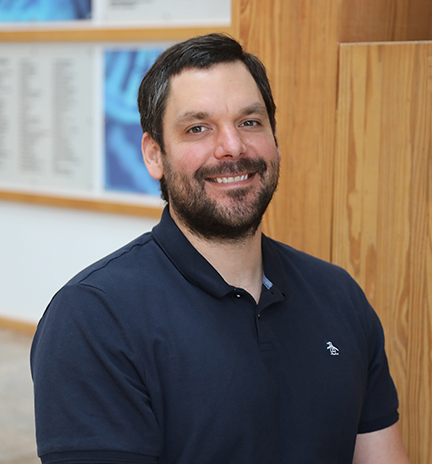About Josh Clevenger

Email: jclevenger@hudsonalpha.org
Location: 601 Genome Way, Huntsville, AL 35806
Peanut genetic improvement by leveraging genomics technologies and computational tools
In the Southeast where interstate rivalries are commonplace, it may seem unusual for an Ohioan to have a dream of pioneering an Alabama crop revolution, but not for HudsonAlpha Institute for Biotechnology Faculty Investigator Josh Clevenger, PhD.
Clevenger, who is a peanut scientist by training, is interested in crop improvement for sustainable agriculture. He is passionate about increasing the diversity of cash crops that are grown in the state of Alabama.
“Historically, Alabama farmers have grown cotton for several hundred years, they began growing peanuts when the boll weevil beetle severely damaged cotton crops, and the remainder of the land is mainly used to grow soybeans, corn, and wheat which aren’t very profitable,” says Clevenger. “In addition, several of the crops that are grown in Alabama were bred for other climates so they do not yield as much as they could elsewhere. The soil in south Alabama is really rich and deserves to be cultivated with crops specifically bred to grow well in Alabama.”
In addition to breeding crops that will flourish in Alabama, Clevenger’s lab also aims to introduce favorable qualities from wild species of crop plants—such as disease and pest resistance—into high-yielding cultivated crops to produce high-yield crops that require the use of fewer pesticides and fungicides.
Because Clevenger’s passion and expertise are in peanut breeding and genomics, his team’s initial focus is incorporating traits from wild species of peanut into cultivated peanut plants that are already widely used. Peanuts struggle with fungal diseases because they are grown in tropical areas where it is very hot and humid. Consequently, peanut farmers must spray fungicides onto peanuts to reduce fungal infection which is very expensive.
By breeding a high-yield peanut plant with a plant that has disease resistance, Clevenger’s lab chooses the disease resistance trait from the wild species in the high-yield cultivated peanut plant. This introduces fungal resistance but maintains the high-yield quality of the cultivated plants. They are using a technique called speed breeding which is essentially exposing the plants to 24 hours of light with no periods of darkness.
“This speeds up the lifecycle from 140 days to 90 days, saving us an average of 50 days with each cross,” says Clevenger. “After three rounds of crossing the peanut plants, we have over a 99.5 percent recovery of the high-yielding plant having the disease resistance segment in it.”
Clevenger’s hope is to bridge the gap between science and nature by more rapidly deploying these beneficial traits into cultivated crops farmers can plant on their land.
Clevenger came to HudsonAlpha in 2020 from Mars-Wrigley’s nut science team. Clevenger earned a PhD from University of Georgia’s Institute for Plant Breeding, Genetics, & Genomics in 2016, a MS in Horticulture and Crop Science from the Ohio State University, and a BS in Biology and Philosophy from Baldwin-Wallace University.
2016 – PhD in Plant Breeding, Genetics, & Genomics, University of Georgia
2012 – MS in Horticulture and Crop Science, The Ohio State University
2009 – BS in Biology and Philosophy, Baldwin-Wallace University
2019-present – American Peanut Research and Education Society publications committee chair
2018-19 – Industry representative, IPGI subcommittee on future of peanut research
2017-18 – Chair of PeanutBase Advisory Committee
Member International Peanut Genome Initiative (IPGI)
Peer reviewer for G3, Molecular Plant, The Plant Journal, Annals of Botany, BMC Genomics,
The Plant Genome, and Molecular Breeding
2016 – UGARF Cultivar Development Research Program review committee
2015 – Committee for Institute of Plant Breeding, Genetics, & Genomics curriculum review
2016 – Outstanding ranking – USDA-NIFA AFRI postdoctoral fellowship
2016 – Joe Sugg Graduate Student Award – APRES annual meeting
2015 – James L. Carmon Scholarship for innovative use of computing
2015 – Glenn and Helen Burton Feeding the Hungry Scholarship
2015 – Bailey Award for best-presented paper – APRES annual meeting
2013-2015 – PhD Scholar of Excellence Fellowship – University of Georgia
2010 – University Fellowship – The Ohio State University
